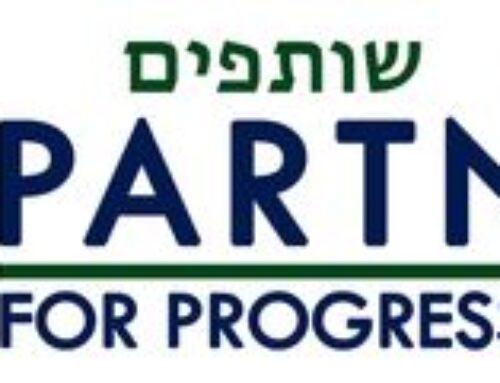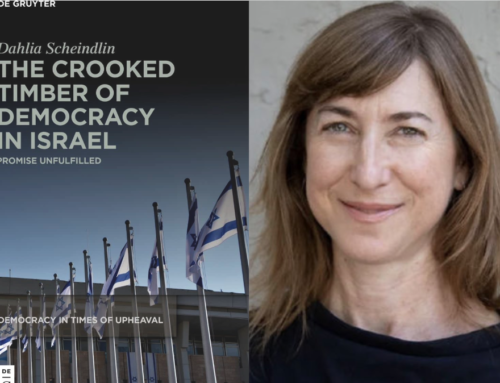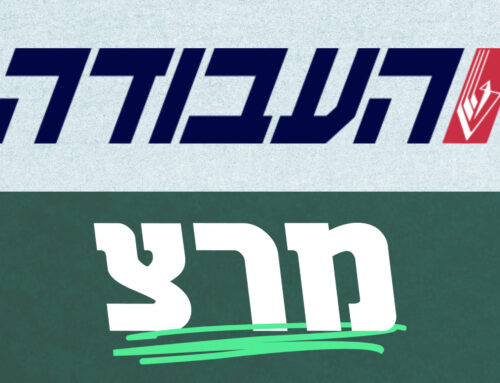Ameinu’s organization, “The Third Narrative,” sponsored a “progressive academic teach-in” at the CUNY Journalism School on November 1. It featured outstanding advocates of Peace, the two-state settlement, and social justice in Israel and Palestine, among them Peter Beinart, JJ Goldberg, Ghaith al-Omari, Todd Gitlin and Michael Walzer, among others. It should be said at the outset that Ameinu assembled a progressive cast that does it credit; the Board Members of PPI in attendance, including Irwin Wall, Leanard Grob, and Lilly Rivlin found little if anything to criticize, except, perhaps, that the panelists all agreed with one another as well as with us. One also could say the gorilla in the room, boycott, was ignored; all seemed to accept that Beinart’s kind of Zionist boycott of the West Bank only, also the policy of PPI, is legitimate. The conference would seem to presage a warmer and more energetic cooperation between our organizations, along the lines of our successful joint petition in favor of supporting the Iran agreement. If this colloquium is indicative of Ameinu’s views, there is little daylight between them and Partners. On the other hand, Israel’s Labor party, of which Ameinu pretends to be the American arm, came in for some severe criticism at the conference. None of the panelists made reference to Meretz. This was regrettable, because it left the implication that there are no voices in Israel to partner with in pursuing the struggle for two states and against the occupation.
Peter Beinart led off, and although most of what he said we have heard before, his argument was cogent and well put-together and his recommendations for action strong and doable. In fact I will propose here later that PPI immediately follow up on one of them. What are Beinart’s points? The Israeli Right and the American Jewish establishment believe that Jew-hatred in the world is visceral and elemental, and all enemies of the Jews are reincarnations of the original Biblical enemy, sons of Esau, Amalekites in the biblical era, today called Nazis or Palestinians. They hate us no matter what we do and they can only be stopped by Jewish power. Settlements today in Palestinian land do not matter or are a smokescreen because our enemies will oppose us anyway, so Israel must keep the settlements and its control over the entire Jordan valley. Palestinian hatred of us precludes allowing the existence of a Palestinian state.
Anti-Zionists, on the other hand, claim as theirs the entire land of Palestine and contest the legitimacy of Jewish nationalism. They reject Oslo or the legitimacy of Jewish national self-determination. The 1967 frontiers are irrelevant for them as they are to Jewish nationalists; there must be one state in Palestine for Jews and Arabs.
To get out of this bind, Beinart says, each side must learn to understand the narrative and legitimacy of the claims of the other. In 1993, in the Oslo agreements, they basically did. However, Rabin’s assassination upset the apple cart and brought the Right to power, and in all subsequent negotiations the Israelis have sought to keep the bulk of the settlements and refused the concessions necessary to create a Palestinian state. The failures of the Palestinians to accept the “offers” made by Barak in 2000 and Olmert in 2008 were due to the fact that the Palestinians were being offered less that they had agreed to at Oslo; the 1967 frontiers with territorial swaps. When they agreed to recognize Israel, they agreed to the 1967 frontiers which gave Israel 78% of the land and the Palestinians the remaining 22%. That is already a big defeat for the Palestinians, and the Oslo accords were never a real recognition of the legitimacy of Israel as a realistic recognition of Israel’s power, a pragmatic surrender. They cannot accept even less than the 22% of the British mandate that Oslo promised them. The danger now is the collapse of the Palestinian Authority because it has failed to deliver a state, either through struggle or diplomacy. Diplomatic movement is necessary to end the current crisis and the renewed violence.
There are three things Americans can do, Beinart says. One: pressure the administration to allow a UN resolution through that defines the parameters of a solution to the conflict. Unfortunately there is little to hope for from our lame-duck president; having won his battle for the Iran agreement he shows little appetite for punishing Netanyahu, who it seems, the more he humiliates the administration, gets even more from it in terms of weapons in recompense. France having withdrawn its own UN effort, largely because of lack of American support, New Zealand has now picked up the ball. The second thing is for Americans to recognize the Palestinians. American Jewish trips to Israel typically ignore the existence of the Palestinians. But more importantly, inject the issue into the campaign. The Republicans are hopeless, they all support Bibi while some of them are to his political Right. But the real disappointment is on the Democratic side; Hillary shows little more daylight between herself and Bibi than the Republicans. Nor has Sanders been articulate or effective; Beinart suggests progressives who are for Israel approach Sanders and try to enlighten him on the Israel-Palestine issue, in the hope that if he energizes American political support for two states Hillary Clinton will have to follow suit. PPI, among American Jewish organizations, is ideologically closest to Sanders and is uniquely suited to follow up on Beinart’s suggestion and I intend to propose to its Board that it do so. Beinart notes that the strong black and Hispanic and Asian presence in the Democratic party, not to mention the growing influence of Arab-Americans who are American-educated and able to present the Palestinian case in terms of the American constitution and human rights, will in the future in “any event bring the Democrats closer to an embrace of the Palestinian cause.
JJ Goldberg and Ghaith al-Omari presented parallel explanations of the current violence and each addressed the bankruptcy of leadership on the two sides in attempting to address it. The operative words are rage and despair. The two previous Palestinian Intifadas, the first largely rock-throwing, the second characterized by terrorist bombings, offer little guidance. Today’s actors are disorganized and spontaneous perpetrators using the most primitive of weapons fashioned from the objects of daily life. Those old enough to drive use their cars to run over Jewish Israelis; the very young assail their oppressors with kitchen knives and screw drivers. There is no organized political presence nor is there obvious leadership or guidance, nor does the movement articulate political goals. It clearly reflects, however, the desperation of the young people who are apparently willing to die, “martyr” themselves as they see it, in order to protest the poverty, hopelessness, and statelessness under which they live. Rage, despair, and hopelessness characterize the Israeli response as well, with two effects. The middle class and secular Jews are emigrating in large numbers (as is the Palestinian middle class). The political center of gravity in Israel continues its precipitous slide to the right, led by the Prime Minister, who presents a sometimes revered historical leader of the Palestinians, the Mufti Haj Amin al-Husseini, as the instigator of the Holocaust while announcing that while he is against a bi-national state, Israel will nevertheless keep control of all the territory between the Jordan river and the sea “for the foreseeable future.” Israel must “live by the sword.” Bibi, it would seem, has endorsed the Apartheid state, although Goldberg cations against use of the word to describe it, it is just as ugly by any other name. And it is indeed open season on Arab lives as Israelis arm themselves and shoot the stabbers. Beinart, for his part, ominously warned that as the generation that witnessed the birth of Israel passes from the scene, the current generation risks witnessing Israel’s demise: a non-Democratic Israel for Beinart would be a “dead Israel.”
The Left such as it is, Goldberg says, is absent in Israel as Herzog cravenly parrots the Rightist language of Netanyahu. Goldberg perhaps did not notice the peace demonstration and call for renewed diplomacy in Tel-Aviv on October 24 at which Zehava Galon and other Meretz MKs were present and Zehava eloquently spoke.
“Bibi, you’ve failed. You’ve failed in providing personal security for the citizens of Israel, you’ve failed in proposing any kind of vision for changing the reality,” she said. “The only thing the Netanyahu government has to offer is for us to arm ourselves, pop anyone who looks like a terrorist in the head. This government is calling for a boycott on Israel’s Arab citizens, is allowing people to kill and agitating against members of the Left,” she said. “I’m telling you Bibi – when blood is spilled here in the name of the Holocaust, the finger won’t be pointed at the Mufti, it will be pointed at you,” she added. (Read more at: http://www.haaretz.com/israel-news/.premium-1.682136.)
But Bibi, whose grasp on power is tenuous, deftly manipulates the politics of fear. The only other rational voices in the country, Goldberg notes, come from the retiring and perhaps politically ambitious generals, who are not afraid to indict settler violence against Palestinians as a contributing cause to the disorders. Indeed we were all treated to the spectacle of Rabbi Arik Ascherman, the Head of Rabbis for Human Rights, being physically attacked by a black-masked settler while the Rabbi was trying to help Palestinians harvest olives. (The Rabbi has frequently addressed the PPI Israel Symposium.) Goldberg asserts that 40 members of the Knesset oppose a Palestinian state. But Bibi always manages to find a willing partner to give him a majority, however narrow as in the present case. And indeed, Herzog might yet become a willing partner to Bibi, except that Labor has some stalwarts at the moment who are unwilling to let the party take that step. JJ himself was colorful to say the least: Herzog looks like a “jerk,” he said, and Bibi’s code word for blaming the Palestinian leadership for the current violence, even as the Palestinian Authority continues its cooperation with the IDF in preventing it, “incitement,” is “bullshit.”’
Al-Omari could do little but note a similar crisis in the Palestinian leadership. Abbas is at the end of his tether and losing control over the PA and the Palestinian people. Reflecting his weakness and failure to deliver on the diplomatic track, he has radicalized his rhetoric in the face of the spontaneous violence. As the violence has made its way to Hebron from Jerusalem it has involved some of the clan-based leadership there that has ties to Hamas. Al-Omari thinks Israel could do much to vitalize the Palestinian peace-oriented leadership: it could release from prison, for example, Marwan Barghouti, who has the status among the Palestinians of a Nelson Mandela, and who is held on similar charges that Mandela faced during his imprisonment in South Africa. (Goldberg was skeptical of Barghouti’s current strength among Palestinians, however). There is much that can be done to strengthen Abbas and the PA, which is not eager to dissolve itself, and Palestinians, despite the current one-state rhetoric one hears from both extreme right and left these days, still want their own national state, land, and flag.
I will refrain from going into similar detail on the interventions of Michael Walzer and Todd Gitlin. Both condemned the current violence but agreed on its causes which they equally condemn; both agreed that BDS as currently constituted does not offer a way out, and that academic boycotts of Israel scholars are indefensible. Gitlin makes an exception however for Ariel University, which is heavily financed by Sheldon Adelson and is being built on Palestinian land strategically situated so as to almost cut the West Bank in two. Ariel University, along with Israeli-run enterprises on the West Bank, are deserving of boycott for Gitlin, who in this reflects the official position of PPI. Gitlin also differed from Walzer on the word Zionism, reflecting another of PPI’s internal debates. Ameinu is still “Labor Zionist,” of course, and Labor in Israel in fact has renamed itself the “Zionist Union” as it tried to out-do Likud in the elections last year. Gitlin no longer calls himself a Zionist: Zionism refers to a historical movement whose goal was fulfilled with the establishment of the state of Israel; to the extent that it has been appropriated by the Right in Israel on behalf of settler colonialism it no longer means what it once did. Walzer argues he will remain a Zionist so long as the fulfillment of the dream of Israel’s establishment remains widely unrecognized.
Ameinu concluded the proceedings with “breakout” sessions that included a plethora of other organizations of young people leading the charge for peace: J Street U, New Voices, If Not Now When?, Combatants for Peace, and as an outlier, Americans for a Vibrant Palestinian Economy. I hope others who attended these can report what went on. For my part I hope that future such Teach-ins can be held involving a broader representation of Peace Groups that, as we speak, are forging new forms of cooperation: J Street, Peace Now, New Israel Fund, Ameinu, and Partners for Progressive Israel.






Irwin,
It was a pleasure to have you and other PPI friends participate in The Third Narrative’s Teach-In. Also thanks for your post on the event.
Two technical corrections — friendly amendments — to your post. First, Ameinu doesn’t pretend to function (or actually function) as the American arm of the Israel Labor Party. Both Ameinu and ILP are collegial members of the World Labor Zionist Alliance, but each has policy autonomy. Sometimes we agree and sometimes disagree. Also, the ILP hasn’t changed its name but ran in the last election as the Zionist Union with Tzipi Livni’s Hatnua party.
Ameinu and The Third Narrative look forward to working closely with PPI and Meretz on the many issues of common concern.
Gideon